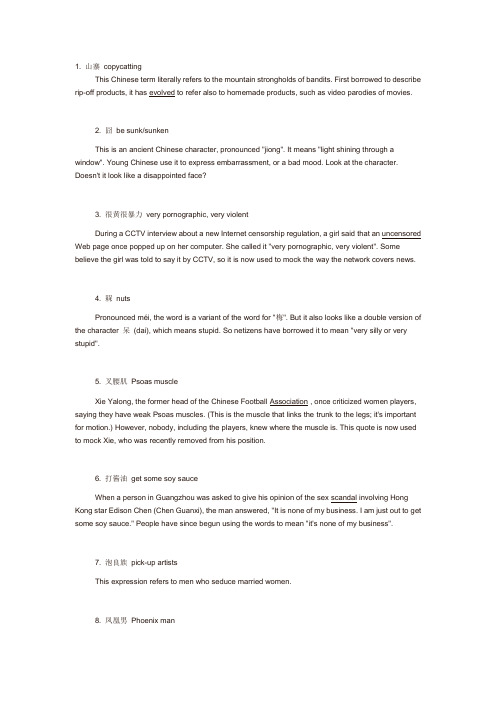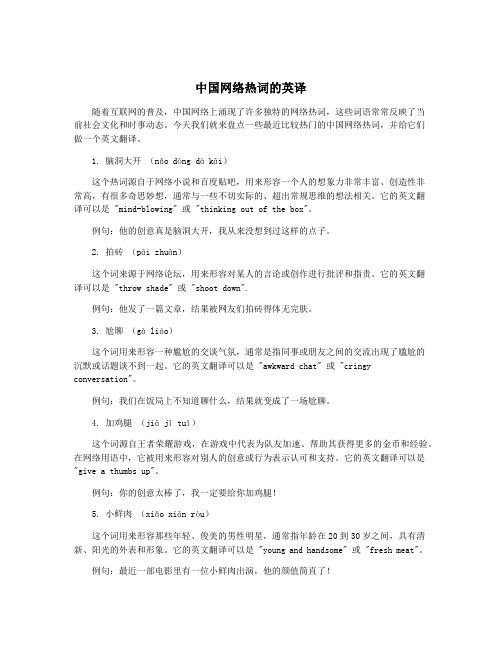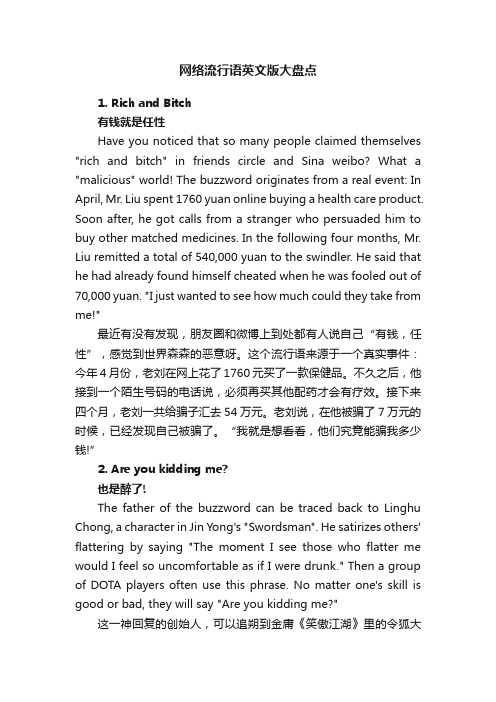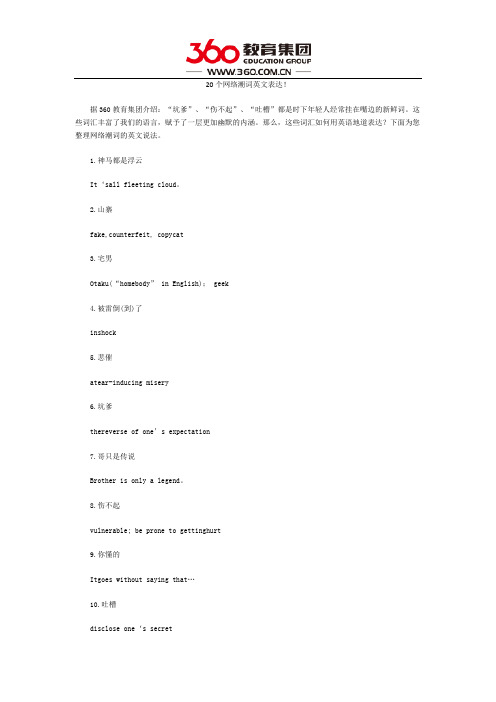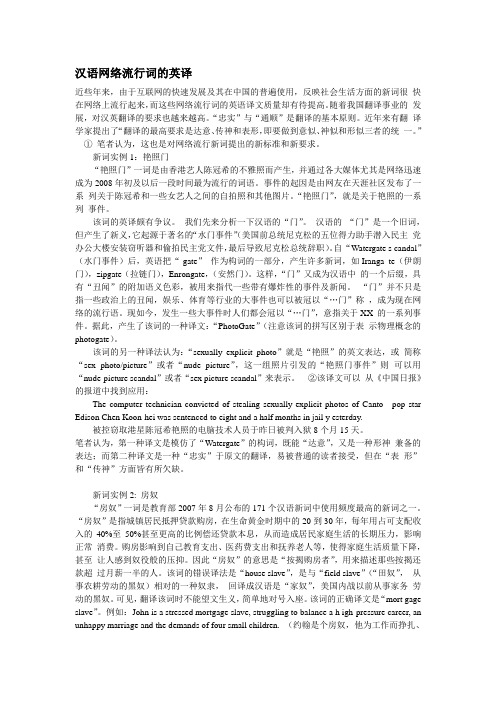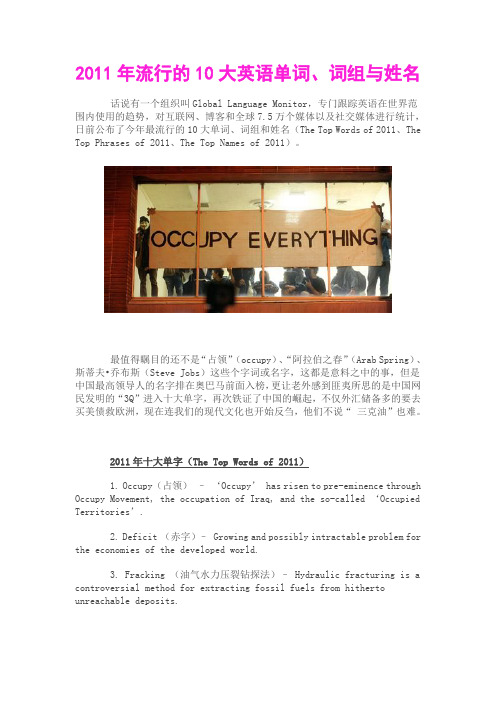1. 山寨copycattingThis Chinese term literally refers to the mountain strongholds of bandits. First borrowed to describe rip-off products, it has evolved to refer also to homemade products, such as video parodies of movies.2. 囧be sunk/sunkenThis is an ancient Chinese character, pronounced "jiong". It means "light shining through a window". Young Chinese use it to express embarrassment, or a bad mood. Look at the character. Doesn't it look like a disappointed face?3. 很黄很暴力very pornographic, very violentDuring a CCTV interview about a new Internet censorship regulation, a girl said that an uncensored Web page once popped up on her computer. She called it "very pornographic, very violent". Some believe the girl was told to say it by CCTV, so it is now used to mock the way the network covers news.4. 槑nutsPronounced méi, the word is a variant of the word for "梅". But it also looks like a double version of the character 呆(dai), which means stupid. So netizens have borrowed it to mean "very silly or very stupid".5. 叉腰肌Psoas muscleXie Yalong, the former head of the Chinese Football Association , once criticized women players, saying they have weak Psoas muscles. (This is the muscle that links the trunk to the legs; it's important for motion.) However, nobody, including the players, knew where the muscle is. This quote is now used to mock Xie, who was recently removed from his position.6. 打酱油get some soy sauceWhen a person in Guangzhou was asked to give his opinion of the sex scandal involving Hong Kong star Edison Chen (Chen Guanxi), the man answered, "It is none of my business. I am just out to get some soy sauce." People have since begun using the words to mean "it's none of my business".7. 泡良族pick-up artistsThis expression refers to men who seduce married women.8. 凤凰男Phoenix manThis expression refers to a man who grew up poor and in the countryside , but later moved to a big city and married a city girl. Due to the couple's different backgrounds and habits, they often encounter problems.9. 做人不能太CNN don't be too CNNIt emerged in response to foreign media's coverage of Tibet. Many Chinese thought it was biased. It gained more popularity after CNN commentator Jack Cafferty's rude talk of China.10. 三个俯卧撑three push-upsA girl in Guizhou was rumored to have been killed by the relatives of local police officials. However, a local government official claimed the girl's boyfriend said the girl had jumped into the river when he was doing push-ups. The popularity of the term signals people's doubts over the story.11. 战略再保证: Strategic reassuranceUS President Barack Obama came carrying a new catchphrase for the Sino-US relationship during his Asia tour —“strategic reassurance.” The US administration’s new strategy toward China appears to mean that the two sides should reassure each other and the rest of the world that their development will not come at the expense of others.12. 钓鱼执法: EntrapmentEntrapment is the act of a law enforcement agent inducing a person to commit an illegal activity that they would not normally have done.13. 临时性: Temporary rapeThe ironic phrase started from a court verdict that gave two former police assistants a lenient sentence of three years imprisonment for rape. The court in Zhejiang Province said it was because the defendants had committed a "temporary crime on a whim."14. 秒杀族: SeckillThe word was originally used in online games when some players or NPCs are killed in a second. It now refers to a group of Internet shoppers bidding zealously on auction items seconds before the deal is closed to gain a big bargain.15. 乙男: Otomen, pinky boyThe Japanese manga “Otomen” and its namesake TV drama features a boy with a secret: the things he really loves are cute dolls, cooking and sewing. The word “otomen” is a pun made of the Japanese word otome, meaning young girl, and the English word "men."16. 蚁族: Ant-like graduatesThe phrase refers to university graduates in big cities like Beijing and Shanghai who can not find a job immediately after their graduation. Unwilling to return to their hometown, they live in densely populated apartments in remote parts of the city that are cheap. These students go out job hunting every day and only return to the rented house for a place to crash, like working ants in nature’s wild.17. 虾米族: Shrimp clanThe term is derived from a popular KFC item featuring seven intact fried shrimps between two pieces of regular bread. It triggers deep thoughts among young consumers over how to live a better life in limited space. The clan refers to those who make the most of their available resources to handle soaring housing prices and salary cuts to maintain their living standards during the global downturn.18. 官二代: The second officer generationThe term, another word popular over the Internet after “the second rich generation” and “the second poor generation,” refers to children from families of senior officials. Their privileges are based on their parents’ power or other useful networks, inste ad of their own accomplishments. This second generation is notorious for their domineering practices and other misdeeds that annoy the public.19. 范儿: StyleThe Chinese term, popular mainly in northern China, refers to one's style --from dressing to general behavior.20. 被当爸: involuntary fatherThe term became popular when an obscure model said she had a child with actor Jude Law, confirmed by a DNA t est. Law was then “forced to be someone’s father” because the model deliberately did not use contraceptives.21. 春夏季: SprummerThe term, developed by Australian scientist Tim Entwisle, is a combination of spring and summer together with another new word “sprinter” indicating an early spring. The term refers to the season between spring and summer, the suggested additional period that is not clearly differentiated from the conventional four.。

